Henry Widdicombe is a former stand-up comedian who has, more recently, built up a production company called Little Wander that deals, primarily, in comedy. However, he’s also a lover of comics who has taken the journey from fan to creator with issue #1 of How To Survive An Affair: A Practical Guide, a raw, emotional and affecting account of infidelity, and relationship breakdown.
In this interview, he chats with Matt Badham about creativity, therapy, bearing his soul in public, collaborations with artists and what his next steps are in terms of making comics.
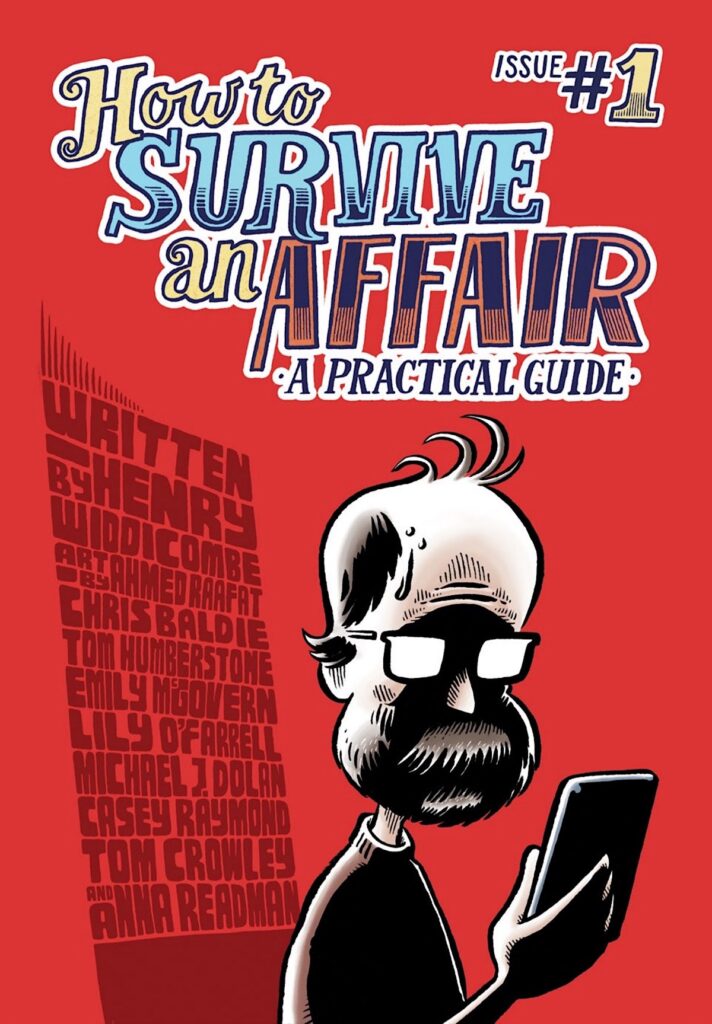
Please tell us what How To Survive An Affair: A Practical Guide is about?
It’s about the breakdown of a relationship I had been in since 1997, and the spectacular fashion that it imploded. It’s very much a record of my human experience of going through this life event, rather than a mud-slinging exercise, which was my absolute worst fear; that I was just embarking on a very time-consuming and expensive endeavour when a bitter Facebook post would have done the same job. But I feel like I’ve achieved what I wanted with it.
You have a background in stand-up comedy, but you have pivoted to comics to tell this story…
That’s right. When I was younger, I did a lot of stand-up, and as a result spent my thirties building Little Wander, which is what I do for a day job. I essentially got so busy running a comedy business that the performance side, and therefore my creative outlet, fell away.
Speaking honestly, I don’t think I was ever really built for the travelling side of stand-up comedy, and my relationship with the audience was the pits. Constantly trying to prove you’re the funniest person in a room of strangers is not a healthy personality trait in my view, but is a way to make a living for those that want to harness it. I had a lot of fun, but always knew it wasn’t what I wanted to be doing long-term.
Writing is where my heart has always found the most satisfaction, and finding which vehicles for my writing play to my strengths, which I feel comic books do.
So, why comics rather than, say, theatre, film or prose?
The therapist I was seeing in order to try and get over what happened to me suggested I write about it. Her first suggestion was ukulele, but I think she could quickly sense my doubts and we settled on writing. Initially I tried doing Morning Pages, which is a stream of conscious writing exercise, but to be honest I found the stuff hitting the page far too real to deal with and it didn’t feel like it was helping at all.
I grew up loving comics, then lost touch with them. Finding myself alone after a 22-year relationship I returned to them like a comfort blanket, and in the space of four years have amassed a quite ludicrous collection. I’d also dabbled with the form previously, as I’d tried to write a superhero comic some years ago.
My first thought was could I turn what happened to me into stand-up but I felt like I was kind of done with that art-form, and that it would be astonishingly hard to make funny on stage. I was sat in my living room surrounded by piles and piles of comics when I realised I should have another crack at writing them.
What is great about writing comics is it’s actually a lot like writing stand-up. Each page can present an idea or observation, and is very clearly bounded. Each page feels like a story in itself, which is both self-contained whilst also being a part of the whole. And it also allowed me to use humour to explore something pretty dark, which has always been my go-to way of dealing with difficulties.
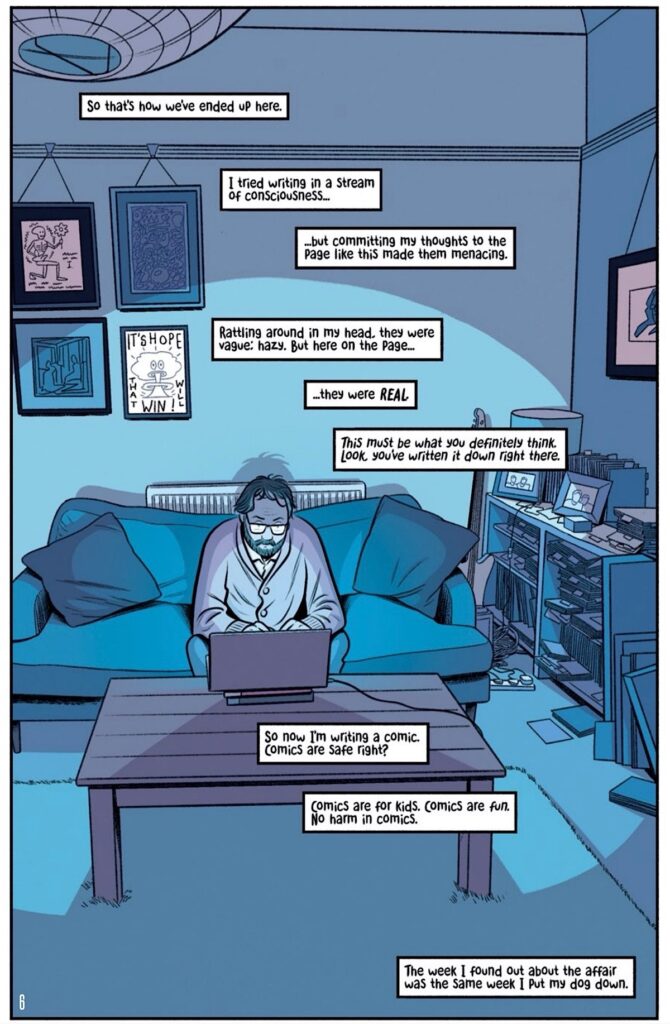
How would you describe your comic, non-fiction? Autofiction? Something else?
Given I used to work in a bookshop you’d think I’d be good at categorising it. I think it’s straight-up autobiographical, masquerading as self-help for a cheap laugh? I wanted it to be the story of what I went through and how it made me feel. It’s a pretty unique situation I found myself in, but also one that will chime with so many people. The last thing I wanted was for it to be recriminating or bitter. I wanted a document of my human experience of going through this. I was always aware that I was presenting my view of what happened and have tried to be respectful of that. Despite releasing it out into the world, I still do primarily view this as an exercise in therapy and a way for me to process and move on from what happened to me.
It’s raw, powerful material (it knocked my socks off). I wonder how it feels to have got it out there and to know that people are reading about the events of your life.
Obviously releasing something so open and honest into the world is daunting, especially when you think about who might end up reading it. And I did weigh up constantly whether this was the right thing to do. But once I’d decided I was going to write this, I knew I wanted to be as brave and honest as I possibly could and not let myself be held back by thoughts of shame or embarrassment. All of my favourite writing is so brazenly honest, and I was trying to channel that bravery.
I think when you’ve been as low as I went during these events, the thought of being that open and honest isn’t that scary anymore. And actually to have documented it into the comic has been a way to take it out of my head and onto a page. It’s an event in my life that I simultaneously want to forget ever happened, whilst also never forgetting that it happened. Having a physical document allows me to move past it while knowing it’s been recorded.
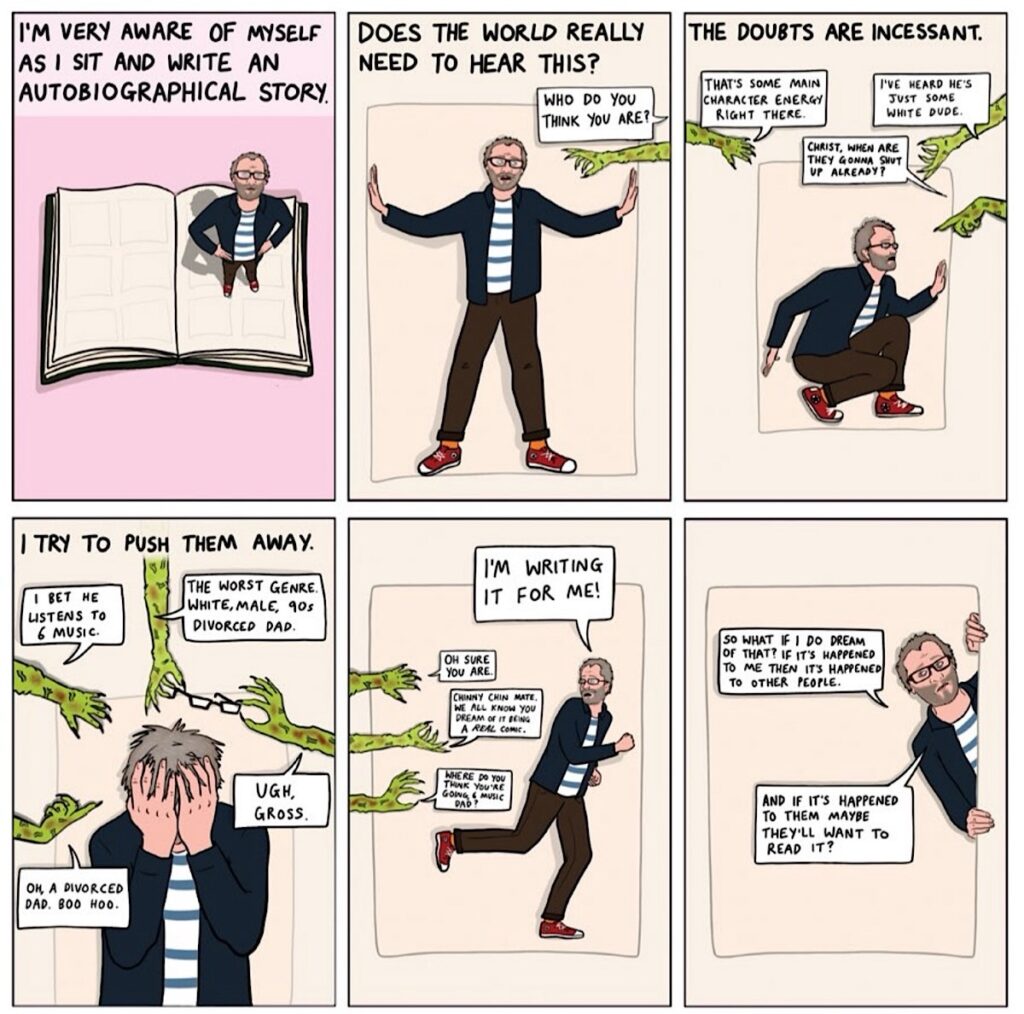
What informed your decision to have multiple artists work on the story, rather than just one?
When I started writing it, it was purely as a therapy exercise, so I wasn’t actually thinking about artists. But I soon realised that for me to mentally invest in it, I would need to believe it could become a thing. So that’s when I started to think about artists, and the factors were really three-fold. I’d always been a fan of Harvey Pekar, and so when I started to think of potential artists I realised that I could pay homage to American Splendor by using different artists for different bits. And once I made this decision, I actually started to think about specific bits of the book in various artists’ styles, hoping they’d take on the pages. So I found myself actually writing for an artist’s style, which was actually really helpful. Luckily, they pretty much all said yes.
Secondly, there were the pure practicalities of it. I was new to this field, and I couldn’t expect anyone to take a chance on me, but asking an artist to take on two to three pages of something is way more likely than asking them to take on 24 pages. And so I knew that my hit-rate for getting my favourite artists would be higher using this method.
And, lastly, there is something meta in that when your world falls apart like mine did, you really don’t know who you are anymore. You don’t know what version of yourself is going to wake up each morning and I felt that these clashing and changing styles helped to represent that feeling of being unmoored and without a sense of self. I wanted it to feel like a coherent story that flowed from style to style but for those styles to unapologetically clash.
Quote: ‘Writing is where my heart has always found the most satisfaction, and finding which vehicles for my writing play to my strengths, which I feel comic books do.’
What are those strengths?
Well, I think it’s a mixture of strengths and weaknesses. The first is that I think I see story very visually so I’ve always felt better suited to the screenplay format, which is how I approached this; writing a script for the artists to effectively act as the directors of their pages. Secondly, I don’t think I have the aptitude to write a novel, for instance. It’s not how my brain works. The reason I like a script is that I can see the story and it’s like writing an instruction manual for what I’m visualising. And lastly, humour is pretty much how I’ve navigated my entire life, and the comics page is so ripe for incorporating humour and using it to puncture or reinforce a given emotion. It also allows for visuals to do the exact same, to choose a style that’s either going to lean into an emotion, or undercut it for humorous ends.
How did you approach artists and how long did that process take?
Some of the artists, like Casey Raymond, Tom Humberstone and Lily O’Farrell I knew already, or at least knew well enough to not be a stranger. Some, like Ahmed Raafat, I’d shuffled up to at Thought Bubble and told them how much I liked their work. And some, like Anna Readman, whose work I adore, was just a complete cold call.
Working in the arts, I knew not to approach any of these artists looking for favours, but to offer their going page-rate. I feel like it was a case of money talks, but also they all seemed to love the script, so hopefully it was win-win, although I can’t talk for them. They’ve all told me they like it anyway! (Laughs).
It was a long process, as, obviously, you have to wait to fit around the artist’s other work. But a rough timeline for this is that I started to write it Christmas 2024, and I was probably approaching artists by March. The first comic came out in July.
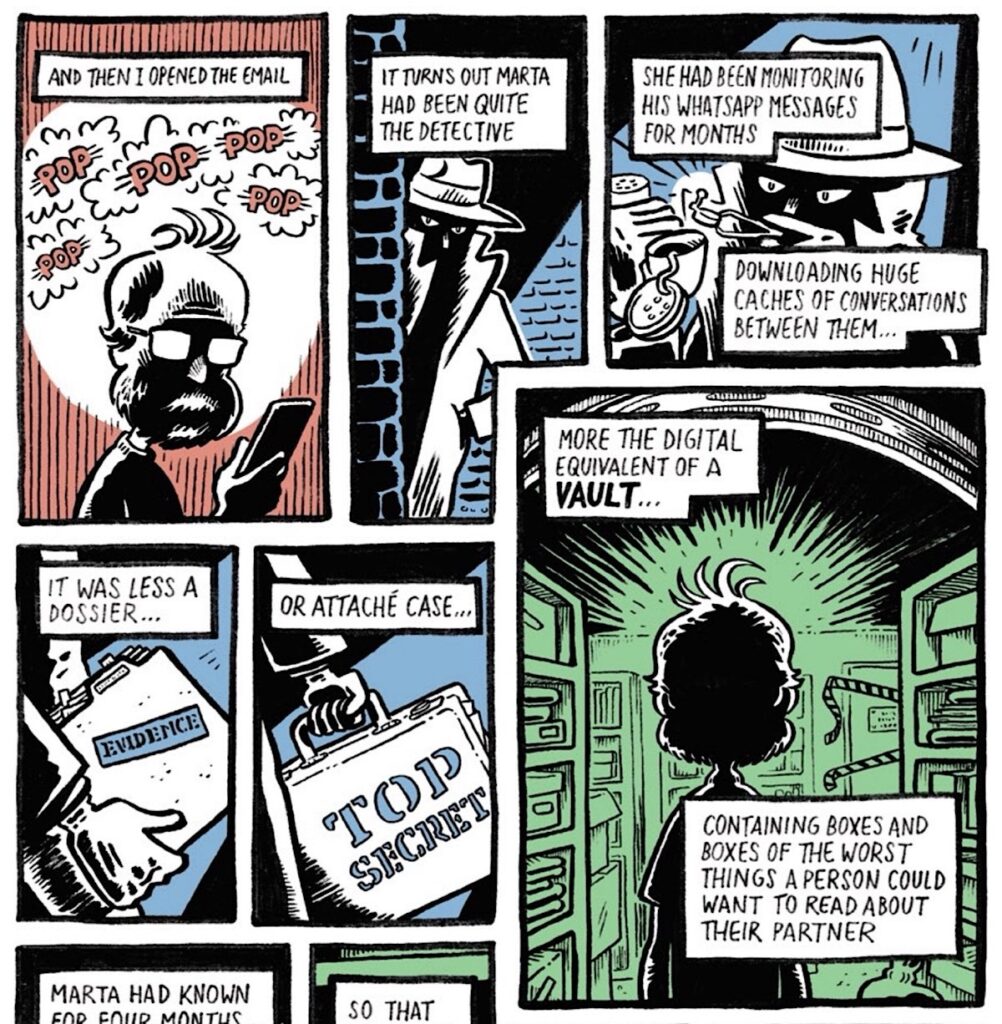
I’ve seen some comments about the comic online, which have been highly favourable, including from at least one established and respected comics maker. What has it been like getting HTSAA out into the world, and what sort of feedback have you had?
I mean, it’s obviously been amazing to get the feedback I have. When you put something out there’s no way of avoiding the nagging doubts that you might be making a massive idiot of yourself. I have battled with that creatively all my life. But the feedback has filled my cup and given me the confidence to go into issue #2 knowing I’m on the right track. Ever since I started to think about comics as an artform I wanted to get involved with, I have found the community exceptionally welcoming and supportive. In a way that perhaps stand-up comedy wasn’t.
To be honest, the respect of my peers has been something I have always been seeking… I have regular counselling on the topic… so it has been really amazing to see how it’s been received both publicly, and in the private messages. And also to receive messages from people who it has personally chimed with and how it has helped them.
What’s next for you in terms of making comics?
Well, issue #2 is being written as we speak, and I’m so excited to work with more artists on it. I’m like a kid in a candy store on that front really. I think I can get this to about fouir to five issues, and then combine them into a book. I also want to convert a short film script I wrote once into a short horror comic, and I need to find an artist for that. And then just Batman, I guess?
• How To Survive An Affair: A Practical Guide, Written by Henry Widdicombe Art by Ahmed Rafaat, Chris Baldie, Tom Humberstone, Emily McGovern, Lily O’Farrell, Michael J. Dolan, Casey Raymond, Tom Crowley and Anna Readman is available from Gosh!, Travelling Man and La Belle Adventure in Edinburgh, or direct from Henry via his web shop here

Henry Widdicombe works and writes in mid Wales. Henry initially worked trying to save the environment, but realising that ship had sailed changed careers to stand-up comedy, both as a performer and promoter. Coming to comics in what he’s optimistically terming mid-life he’s hoping that it becomes his main creative outlet for the foreseeable future.
Henry Widdicombe will be appearing at GoshFest 2025 on Saturday 30th August 2025 – Full lineup here – and Thought Bubble in November
• Henry Widdicombe is online at widdicomics.co.uk
• Follow Henry Widdicombe on Instagram
• Little Wander are online at littlewander.co.uk
Categories: British Comics, Comic Creator Interviews, Comics, Creating Comics, downthetubes Comics News, downthetubes News, Features
 Creating Comics: Scripting Spooky Strips
Creating Comics: Scripting Spooky Strips  Bones & Betrayals: A Chat with Andi Ewington, Erica Marks and Calum Alexander Watt
Bones & Betrayals: A Chat with Andi Ewington, Erica Marks and Calum Alexander Watt  Crowdfunding Spotlight : An Interview with Rachael Smith, creator of Nap Comix
Crowdfunding Spotlight : An Interview with Rachael Smith, creator of Nap Comix 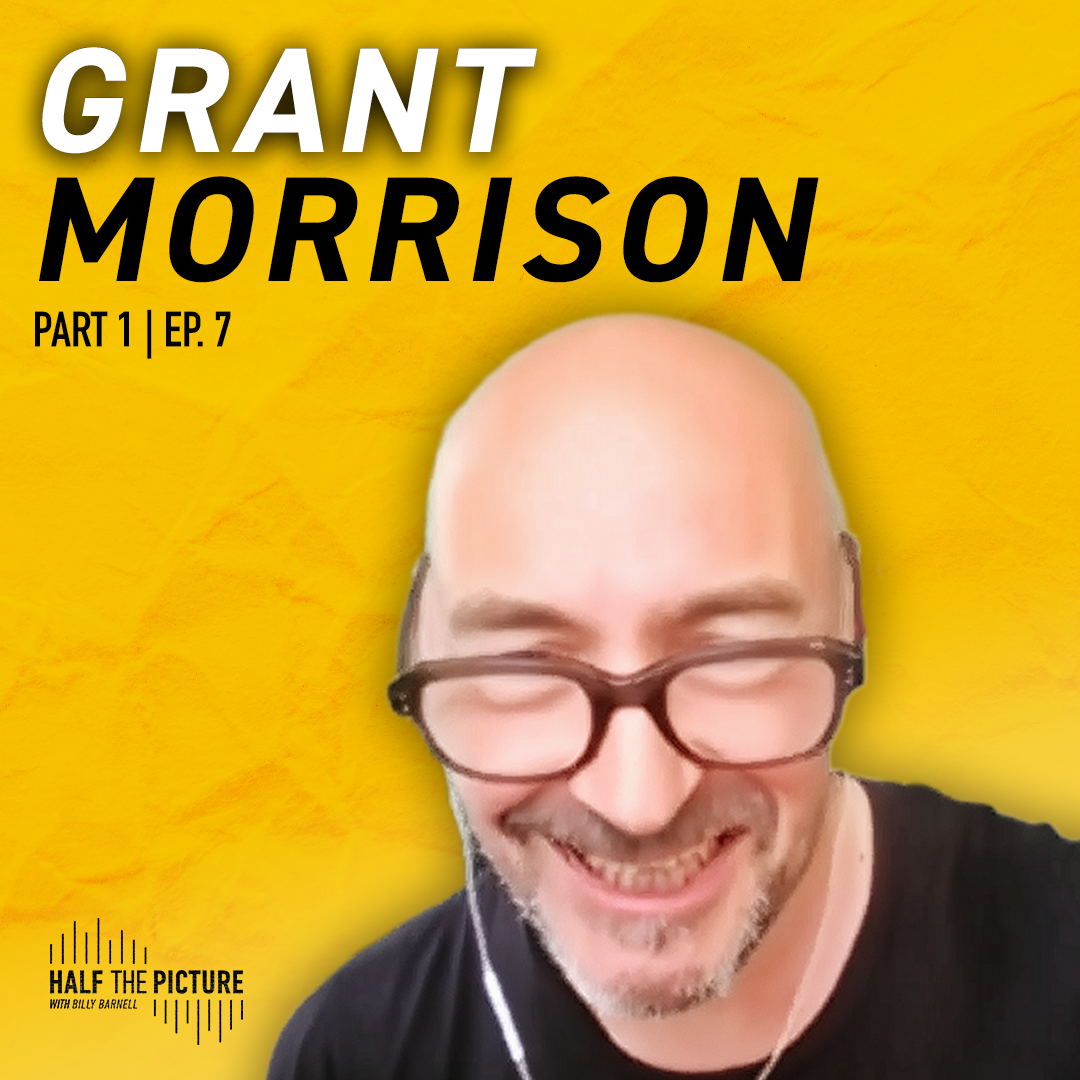 Creating Comics: Half the Picture presents Grant Morrison MBE
Creating Comics: Half the Picture presents Grant Morrison MBE